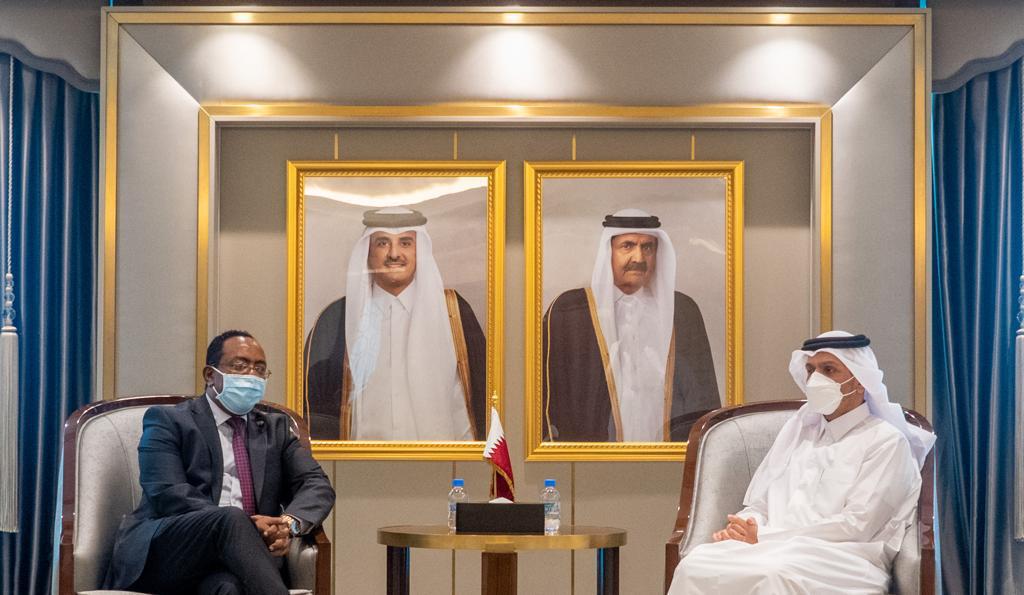Ethiopia has been involved in a dispute with Sudan and Egypt over the Grand Ethiopian Renaissance Dam [GERD] project on the shared Blue Nile, which has been a source of tensions since 2011.
Qatar’s Minister of Foreign Affairs Sheikh Mohammed bin Abdulrahman Al-Thani held a meeting with the Minister of State for Foreign Affairs of the Federal Democratic Republic of Ethiopia Redwan Hussien in Doha on Wednesday.
During the meeting, the two officials discussed their countries’ bilateral cooperation, the latest developments in the African horn and the importance of resolving Ethiopia’s differences peacefully and diplomatically.
This came following Sheikh Mohammed’s statements during his visit to Sudan earlier this week, where he discussed several issues with his Sudanese counterpart Maryam Al-Sadiq Al-Mahdi, including tensions with Ethiopia over the GERD.
The foreign minister’s statements hinted to possible mediation efforts by the Gulf state given its known role as a regional and international mediator.
“It is likely that Qatar would mediate on the issue of the Renaissance Dam between Egypt and Sudan on the one hand, and Ethiopia on the other hand,” veteran Qatari journalist Jaber Al Harami told Al Araby Al Jadeed, responding to a question over the Gulf State’s mediation in the feud.
A decade-long dispute
The GERD has long been the cause of a dispute between the Ethiopian side and Egypt and Sudan since as far as 2011.
The feud was triggered by Ethiopia’s decision to construct the dam on the Blue Nile, which it shares with Egypt and Sudan, in order to create a large hydroelectric project to supply its people with electricity.
The GERD would allow Ethiopia to double its electric capacity and further enable it to be sufficient in electricity, while making it Africa’s biggest power exporter.
However, Egypt and Sudan have both voiced their concerns over its construction for reasons that have concerned each country.
Read also: Qatar to continue supporting Sudan, FM says
On one hand, Cairo heavily relies on the Nile’s waters for household and commercial use, including irrigation, and believes the construction of the dam would lead to a drastic decline in its water security.
Khartoum, on the other hand, is concerned over the GERD’s safety and the possible effect its construction would have on the water flow of the Nile to Sudan.
Negotiations regarding reaching a resolution between the three countries are still underway, but concerns remain over the filling of he dam.
Tigray conflict
On the domestic side, Ethiopia has been facing a conflict since November last year, when its federal government declared war on its northern region of Tigray in response to an attack on a military base housing government troops. The war was a build up of tensions between the two parties dating as far as the 90’s.
Thousands of people have been killed during the war and hundreds of thousands forced from their homes in the Tigray region, with five million in need of aid.
US President Joe Biden called for a ceasefire on Wednesday, urging an end to the “large-scale human rights abuses” in the Tigray region as he was “deeply concerned” over the escalating violence.
“The large-scale human rights abuses taking place in Tigray, including widespread sexual violence, are unacceptable and must end,” said Biden, calling for the withdrawal of Ethiopian and Amhara forces from Tigray.
“Belligerents in the Tigray region should declare and adhere to a ceasefire, and Eritrean and Amhara forces should withdraw.”
Follow Doha News on Twitter, Instagram, Facebook and Youtube







